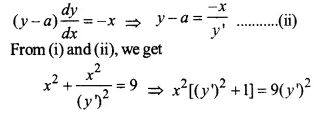NCERT Solutions for Class 12 Maths Chapter 9 Differential Equations Ex 9.3 are part of NCERT Solutions for Class 12 Maths. Here we have given NCERT Solutions for Class 12 Maths Chapter 9 Differential Equations Ex 9.3.
- Differential Equations Class 12 Ex 9.1
- Differential Equations Class 12 Ex 9.2
- Differential Equations Class 12 Ex 9.4
- Differential Equations Class 12 Ex 9.5
- Differential Equations Class 12 Ex 9.6
| Board | CBSE |
| Textbook | NCERT |
| Class | Class 12 |
| Subject | Maths |
| Chapter | Chapter 9 |
| Chapter Name | Differential Equations |
| Exercise | Ex 9.3 |
| Number of Questions Solved | 12 |
| Category | NCERT Solutions |
NCERT Solutions for Class 12 Maths Chapter 9 Differential Equations Ex 9.3
In each of the following, Q. 1 to 5 form a differential equation representing the given family of curves by eliminating arbitrary constants a and b.
Ex 9.3 Class 12 Maths Question 1.
\(\frac { x }{ a } +\frac { y }{ b } =1\)
Solution:
Given that \(\frac { x }{ a } +\frac { y }{ b } =1\) …(i)
differentiating (i) w.r.t x, we get
\(\frac { 1 }{ a } +\frac { 1 }{ b } { y }^{ I }=0\) …(ii)
again differentiating w.r.t x, we get
\(\frac { 1 }{ b } { y }^{ II }=0\Rightarrow { y }^{ II }=0\)
which is the required differential equation
Ex 9.3 Class 12 Maths Question 2.
y² = a(b² – x²)
Solution:
given that
y² = a(b² – x²)…(i)

Ex 9.3 Class 12 Maths Question 3.
y = ae3x+be-2x
Solution:
Given that
y = ae3x+be-2x …(i)

Ex 9.3 Class 12 Maths Question 4.
y = e2x (a+bx)
Solution:
y = e2x (a+bx)

Ex 9.3 Class 12 Maths Question 5.
y = ex(a cosx+b sinx)
Solution:
The curve y = ex(a cosx+b sinx) …(i)
differentiating w.r.t x

Ex 9.3 Class 12 Maths Question 6.
Form the differential equation of the family of circles touching the y axis at origin
Solution:
The equation of the circle with centre (a, 0) and radius a, which touches y- axis at origin

Ex 9.3 Class 12 Maths Question 7.
Form the differential equation of the family of parabolas having vertex at origin and axis along positive y-axis.
Solution:
The equation of parabola having vertex at the origin and axis along positive y-axis is

Ex 9.3 Class 12 Maths Question 8.
Form the differential equation of family of ellipses having foci on y-axis and centre at origin.
Solution:
The equation of family ellipses having foci at y- axis is

Ex 9.3 Class 12 Maths Question 9.
Form the differential equation of the family of hyperbolas having foci on x-axis and centre at the origin.
Solution:
Equation of the hyperbola is \(\frac { { x }^{ 2 } }{ { a }^{ 2 } } -\frac { { y }^{ 2 } }{ { b }^{ 2 } } =1\)
Differentiating both sides w.r.t x

which is the req. differential eq. of the hyperbola.
Ex 9.3 Class 12 Maths Question 10.
Form the differential equation of the family of circles having centre on y-axis and radius 3 units
Solution:
Let centre be (0, a) and r = 3
Equation of circle is
x² + (y – a)² = 9 …(i)
Differentiating both sides, we get

which is required equation
Ex 9.3 Class 12 Maths Question 11.
Which of the following differential equation has \(y={ c }_{ 1 }{ e }^{ x }+{ c }_{ 2 }{ e }^{ -x }\) as the general solution ?
(a) \(\frac { { d }^{ 2 }y }{ { dx }^{ 2 } } +y=0\)
(b) \(\frac { { d }^{ 2 }y }{ { dx }^{ 2 } } -y=0\)
(c) \(\frac { { d }^{ 2 }y }{ { dx }^{ 2 } } +1=0\)
(d) \(\frac { { d }^{ 2 }y }{ { dx }^{ 2 } } -1=0\)
Solution:
(b) \(y={ c }_{ 1 }{ e }^{ x }+{ c }_{ 2 }{ e }^{ -x }\Rightarrow \frac { dy }{ dx } ={ c }_{ 1 }{ e }^{ x }-{ c }_{ 2 }{ e }^{ -x }\)
\(\frac { { d }^{ 2 }y }{ { dx }^{ 2 } } ={ c }_{ 1 }{ e }^{ x }+{ c }_{ 2 }{ e }^{ -x }\Rightarrow \frac { { d }^{ 2 }y }{ { dx }^{ 2 } } -y=0\)
Ex 9.3 Class 12 Maths Question 12.
Which of the following differential equations has y = x as one of its particular solution ?
(a) \(\frac { { d }^{ 2 }y }{ { dx }^{ 2 } } -{ x }^{ 2 }\frac { dy }{ dx } +xy=x\)
(b) \(\frac { { d }^{ 2 }y }{ { dx }^{ 2 } } +{ x }\frac { dy }{ dx } +xy=x\)
(c) \(\frac { { d }^{ 2 }y }{ { dx }^{ 2 } } -{ x }^{ 2 }\frac { dy }{ dx } +xy=0\)
(d) \(\frac { { d }^{ 2 }y }{ { dx }^{ 2 } } +{ x }\frac { dy }{ dx } +xy=0\)
Solution:
(c) y = x
\(\frac { dy }{ dx } =1,\frac { { d }^{ 2 }y }{ { dx }^{ 2 } } =0\)
\(\frac { { d }^{ 2 }y }{ { dx }^{ 2 } } -{ x }^{ 2 }\frac { dy }{ dx } +xy=0\)
We hope the NCERT Solutions for Class 12 Maths Chapter 9 Differential Equations Ex 9.3 help you. If you have any query regarding NCERT Solutions for Class 12 Maths Chapter 9 Differential Equations Ex 9.3, drop a comment below and we will get back to you at the earliest.